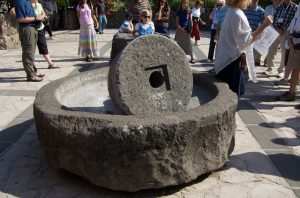Today is the second of our three-part series on giving smartphones to our children when we ourselves actually think they’re still too young. The feedback has been good so far: Some of us have expressed regret about our mistakes, and some have admitted our own excessive behaviours. The best news is we all want to do better, so Jesus is clearly leading us!
Today’s Gospel continues last week’s: Jesus is no longer addressing the crowds but giving in-depth instruction to His disciples (like us) on how to love. At first, He shows the power of small, loving actions: “Truly I tell you, whoever gives you a cup of water to drink because you bear the name of Christ will by no means lose the reward” (Mk 9:41).
But then He warns us against small actions that hurt people spiritually. Just so you know, because of Jesus’ words, today’s homily is going to focus on the negative aspects of smartphone usage, and then next week’s homily will focus on a positive question: What kind of life does Jesus want for us? That said, today Jesus teaches, “If any of you put a stumbling block before one of these little ones who believe in me, it would be better for you if a great millstone were hung around your neck and you were thrown into the sea” (9:42). ‘Little ones’ refers to children or anyone who’s weak or vulnerable, while ‘stumbling block’ refers to making them fall spiritually or leading them away from faith in Jesus. Here are two pictures of millstones which were used to grind and crush things as they spin in a slot:
- Source: https://shirinmcarthur.com/
The word ‘great’ literally means ‘donkey’ because these millstones were hundreds of pounds and a donkey was needed to move them.
So, the truth Jesus is communicating is: If we cause someone to turn away from Him through our own deliberate actions, it would be better if this millstone were wrapped around our necks and we were drowned in the sea. Wow! Why’s that? Because that’s better than hell; hell is so bad that death is better! This is how seriously Jesus takes sin. As we’ve discussed before, sin is the worst thing in the world; mortal sin is worse than death, worse than drowning. A person once said, ‘Divorce is worse than death. If my husband had died, at least I would know that he still loved me; but, when we got divorced, it’s because he doesn’t love me anymore.’
Jesus doesn’t send people to hell; we freely choose it by moving ourselves away from Him. He doesn’t want us to choose it, which is why He died and rose for us, so that we would choose love. Therefore, when Jesus uses the metaphor of the millstone, He’s using Rabbinic exaggeration so that we understand His point.
Let’s apply this to our situation, but, before we consider if our smartphones can lead us away from Jesus, let’s ask: Can every sin be forgiven? Yes. Even mortal sins? Yes. How? Through Baptism and Confession. So, the point is not to discourage. All of us have probably committed mortal sins, I’ve committed mortal sins, Deacon Andrew has probably committed more, and Fr. Richard probably off the charts. Jesus loves us and died to forgive these sins. The point is to avoid mortal sins in the future. Here are seven ways smartphones can, not necessarily, lead us to sin against Jesus:
1) Self-worship/Vanity: Social media can condition us to glorify ourselves with our sharing, by focusing on the number of likes, friends, comments, responses. We’re happy when our numbers are high and depressed when they’re low—not good.
2) Envy: Social media is a world of comparisons: We envy what others have, how they live, how they look, rather than accept our lives with gratitude.
3) Rudeness/Impatience: In a worldwide survey of 9,000 people, “44 percent… said they have a right to do whatever they want with their mobile devices, even if it bothers someone else”, such as not paying attention when people talk to us, looking at our phones while eating with others. Online gossip and voicing all our angry thoughts are not loving. Even worse is online bullying.
4) Deliberate Distractions/Wasting Time: Here’s a screenshot from Statistics Canada: 45% of smartphone users check their phone every 30 minutes—not good for prayer, relationships, work, school; 56% of users check their phone as the last thing they do before going to bed. This time can be better used.
The Bible teaches us that God is our Father, that we’re made for eternity, but scrolling mindlessly distracts us from this most important reality. FOMO exploded with social media.
5) Consumeristic Mentality: The best things in life are God, relationships, and working towards worthwhile goals, but our phones make us focus on things.
6) Addiction to Instant Gratification: Our phones condition us to expect God, people, and life to give us what we want when we want it, and that’s horrible for relationships and life.
7) Pornography/Sexting: Because sexuality is so beautiful, good, and sacred, we should cherish and protect it. Jesus taught that to lust deliberately after people in our hearts is a mortal sin; this is why pornography and sexting are mortal sins. If we start when we’re young, Jesus will help us, but it’s hard to get off. So, we should wait until we’re older to have a smartphone so that we can build up strength while young.
These seven temptations are just versions of the seven deadly sins: pride, envy, wrath, sloth, avarice, gluttony, lust. Smartphones are more useful than almost any tool humanity has ever created (knives, cars) and they’re also more dangerous.
On September 10, 2024 the prime minister of Australia announced that the country will introduce legislation that all social media have a minimum age limit of between 14-16. He said (I wish I could do an Australian accent), “I want to see kids off their devices and onto the footy fields and the swimming pools and the tennis courts. We want them to have real experiences with real people because we know that social media is causing social harm. This is a scourge. We know that there is mental health consequences for what many of the young people have had to deal with”. That’s a great first step. Locally, on the Sunshine Coast, a secondary school enforced a ban of no phones in the class, and everyone’s doing better.
Because Jesus wants us to be perfectly happy, He calls us to do our best, to take radical action, “If your hand causes you to stumble, cut it off; it is better for you to enter life maimed than to have two hands and to go to hell, to the unquenchable fire. And if your foot causes you to stumble, cut it off; it is better for you to enter life lame than to have two feet and to be thrown into hell. And if your eye causes you to stumble, tear it out; it is better for you to enter the kingdom of God with one eye than to have two eyes and to be thrown into hell, where their worm never dies, and the fire is never quenched” (9:43, 45,47-48). We know He’s exaggerating because no Christian ever practiced this. In the past, whenever I gave talks on hell, I would also introduce it with the famous 1970s’ song Disco Inferno, of which the refrain is ‘Burn, Baby, burn.’ I would do this so no one was overwhelmed, but would take Jesus’ warning seriously about the real possibility of choosing hell. If our phone causes us to commit mortal sin, leave it outside of the bedroom, get accountability software—not the free, lame versions; spend money on it! Every family should consider having smartphone rules about when and where and how long we can use our phones. When it comes to our phones in church, in the house of God, we only use them for prayer. It’s a venial sin of disrespect to be checking messages and scrolling while we’re before Jesus.
As mentioned, today we have a survey. The cards are in your pews. If you could take 30 seconds to fill it out and then place it in the collection basket, that would be great. Thank you! We’ll give the results next week.
Here’s a summary of today’s teaching: small actions can either do great harm or great good; the worst thing in the world is not suffering or death but sin; because smartphones are so dangerous, they can lead us to choosing hell; so, we must act radically with God’s grace to root out sin in our lives.



